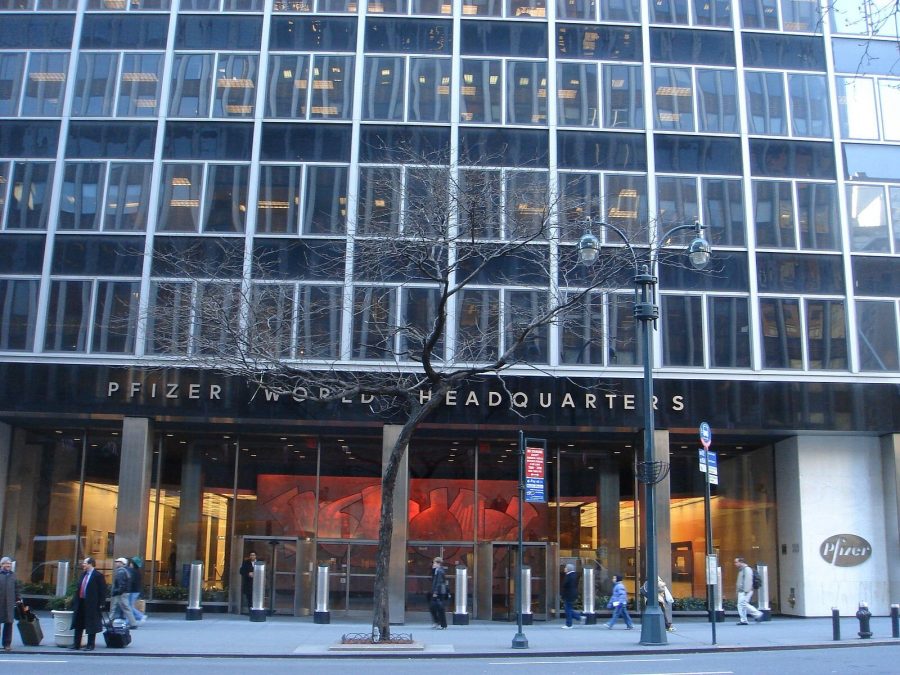Pfizer vaccine success generates hope while COVID-19 continues to surge
November 13, 2020
The international biopharmaceutical company Pfizer revealed their COVID-19 vaccine was 90% effective in protecting participants from the virus in their latest Phase 3 trials, according to a statement released on Nov. 9.
Pfizer, in collaboration with the German biotechnology company BioNTech, has produced one of the 11 vaccines currently in the final stage of testing and worked with over 43,000 participants since the study commenced on July 27.
The vaccine’s performance outperformed the FDA’s requirement of at least 50% efficacy for any vaccine seeking emergency approval.
Although the efficacy results are subject to change as more information is collected, the overwhelmingly positive results found by the initial examination of the trial’s data by a group of experts sparked optimism at a time when it is desperately needed.
“Today is a great day for science and humanity,” said Dr. Albert Bourla, Pfizer CEO, in a press release. “We are reaching this critical milestone in our vaccine development program at a time when the world needs it most with infection rates setting new records, hospitals nearing over-capacity and economies struggling to reopen.”
The start of November has been characterized by the fatal surge in coronavirus cases across the globe, with the 7-day average for cases well over half a million. Records are consistently being shattered in the United States as the daily total of cases nationwide exceeded 100,000 for the first time on Nov. 4.
These trends are not anomalies. Over the summer, when several states were amid their first wave of COVID-19 outbreaks, health experts warned of a potential resurgence during the fall and winter seasons. “I do think the fall and the winter of 2020 and 2021 are going to be probably one of the most difficult times that we’ve experienced in American public health,” said Dr. Robert Redfield, director of the Centers of Disease Control and Prevention, in July.
With the realistic threat of the current record numbers persisting to the early months of 2021 and beyond, Pfizer’s vaccine could be vital in saving hundreds of thousands of lives.
Vice President Mike Pence attributed Pfizer’s breakthrough to President Donald Trump’s relationship with the company under Operation Warp Speed in a tweet on Nov. 9.
Bourla denied Pfizer had partnered with President Trump’s administration or accepted any funds from the administration’s accelerated vaccine program. “It’s not that we are arrogant or we believe that we can do it alone,” Bourla said. “The reason why I did it was because I wanted to liberate our scientists from any bureaucracy that could come by accepting money.”
Several scientists are optimistic about Pfizer’s vaccine due to its unexpected level of efficacy in the preliminary stages of results. The surprising success of the vaccine, however, has also kindled skepticism in the company’s report. “Science by press release is not reliable science,” Julia Belluz of Vox said.
Before the vaccine can be authorized for emergency use by the FDA, more data on the efficacy, safety and manufacturing of the antidote is required.
Despite this, officials and health experts are looking ahead to the potential mass distribution of the vaccine. Since Pfizer’s vaccine is composed of mRNA, it needs to be consistently kept at freezing temperatures. Any mobilization of the vaccine in the near future will require a method of transportation that ensures the vaccine is stored at minus 80 degrees Celsius or cooler at all times.
While this is a towering challenge considering the vaccine, if authorized, would be shipped across continents, Pfizer has created coolers dedicated to the storing and shipping of the vaccine.
Distribution of the vaccine, however, is far from being organized. For now, Pfizer’s success is only an indication that the end of the coronavirus pandemic may be in sight.








